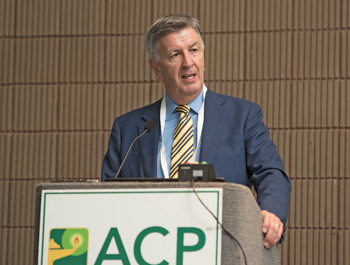Coverage from Internal Medicine Meeting 2018 highlights future of medicine
This issue also covers ACP's Leadership Day event, an annual gathering of members in Washington, D.C., to meet with members of Congress and their staffers.
It was a banner year at Internal Medicine Meeting 2018, held from April 19 through April 21 in New Orleans, where a record-setting number of attendees (especially those of us from the East Coast!) enjoyed a first taste of spring weather, fantastic food and music, and the chance to gather with colleagues and take advantage of the excellent educational opportunities ACP is known for. Our editorial staff provided daily updates as always, as well as expanded coverage for this special issue.
Our story this month outlines—and debunks—many of the myths about diverticulitis, which have been disproven over the past decade. For example, it was once thought that eating nuts, popcorn, and seeds would increase risk for an attack and that recurrent bouts signaled more severe attacks to come, but neither is the case, according to presenter Anne Peery, MD, MSCR. Read our story for more on drugs that increase the risk for this condition, the latest thinking about antibiotics as treatment, and why elective hemicolectomy can help but isn't always a cure-all.
Another story looks at Helicobacter pylori and offers advice on how to handle this notoriously difficult-to-treat infection. Gastroenterologist Colin W. Howden, MD, provided session attendees with an extensive rundown of which therapies have the best chance of cure in which patients. The previous standard of care, clarithromycin triple therapy, has fallen so far out of favor that Dr. Howden considers it obsolete, while bismuth-based quadruple therapy is back in fashion, along with the newer “kitchen-sink” approach of concomitant therapy. Also covered are the best regimens for patients with a history of macrolide use and those with a true penicillin allergy.
Coverage from New Orleans continues. Learn about the risk factors for elder abuse and neglect, how to distinguish physical abuse or neglect from normal aging, which type of elder abuse is most common, and how best to take action if you feel one of your patients is being affected. Another story covers the ins and outs of chronic cough and provides encouragement for physicians to really work to get the bottom of its cause in their patients, given that the condition can hang around for years, if not decades, without proper treatment.
Read an overview of the brave new world of “wearables” and how a panel of three experts think these devices may, and may not, help reshape medical care. Speaking of the future of medicine, read a fascinating synopsis of the potential of the microbiome, as presented at the first annual Dr. Ananda Prasad Lecture in Physiology. Read one expert's thoughts on putting breast density into perspective when deciding on screening for breast cancer, including how using a woman's baseline risk can help guide decision making. Finally, a geriatrician describes the best way to incorporate frailty into preoperative screening of elderly patients, and a palliative care expert provides some clinical pearls.
We hope you enjoy this issue! Please let us know what you think.
Sincerely,
Jennifer Kearney-Strouse
Executive Editor, ACP Internist




